新概念英语第一册第19课课文及翻译
新概念英语第一册精品课件PPT Lesson19-20(共35页)
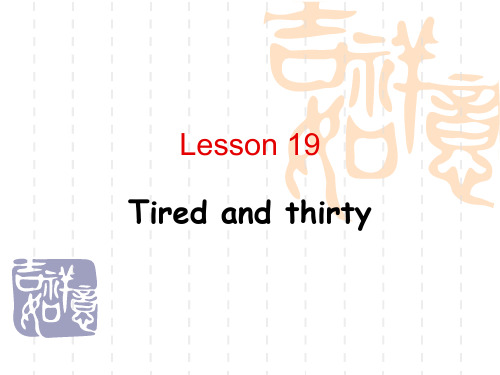
▪ 2) 右边,右边的 ▪ Left 左边,左边的
▪ on the right 在右边 ▪ on the left 在左边
▪ 3)正确的 ▪ That’s right. 没错。
▪ ice cream 冰淇淋(有时可数,有时不可数) ▪ cream 乳酪, 奶油, (护肤)面霜 ▪ scream尖声叫 ▪ The boy was screaming with pain. 这男孩痛得
尖叫起来。
▪ ice 不可数名词 ▪ ice tea 冰茶 ▪ icy ['aisi] a. 冰凉的,冰爽的
▪ There be 句型 ▪ there be(is/are) 句型:表示某处有某物 ▪ there is + 可数名词的单数/不可数名词+介词短语
▪ There is a pen, two books and a knife on the desk.
▪ sick 生病,难受,尤指恶心的那种。 ▪ I’m sick of it. 我特烦那事。 ▪ be sick of 一见到…就恶心,引申为“讨厌”。
▪ boy n.▪ ---- They are his sons. ▪ Boy! 我的天啊! 单独使用并大写首字
里的学生有强烈的求知欲。
▪ Sit down. ▪ Stand up.
▪ right adj. ▪ 1) 好的,可以 ▪ ---- Let’s go upstairs and see my blouse. ▪ 让我们上楼看看我的新衬衫。 ▪ ---- All right. ▪ 好吧,走吧。
▪ ---- I fell off the stairs. ▪ 我从楼梯上摔了下来。 ▪ ---- Are you all right? / Are you OK? ▪ 你还好吧? ▪ ---- Yes, I am. ▪ 我还好,没什么事儿。
新概念英语一册第19课课件
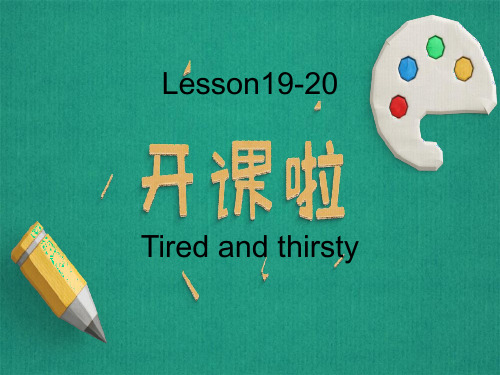
3.There's an ice cream man. There is =There's,there be 句型中的一种形式。 an,用在以元音字母开头并发元音的单词前 4.mum 是儿童口语的妈妈 妈妈也可以说mummy,爸爸在儿童口语中可以说daddy.dad
1.there +be
在说明或者询问人、物的存在时使用there +be 结构。此结构中的实 际主语是be 后面的名词。因为,假如该名词是单数就用is,如果是复 数则为are。 There is a book. There are two books. 例如: There's an ice cream man.
Lesson19-20 Tired and thirsty
Listen and answer the questions
Why do the children thank their mother?
Because their mother bought ice creams for them.
Lesson 19
MOTHER: Here you are, children. CHILDREN: Thanks, Mum.
GIRL: These ice creams are nice. MOTHER: Are you all right now? CHILDREN: Yes, we are, thank you!
There are many students in the classroom.
2英语中系动词be必须根据不同的人称代词作相应的变化。包括部分 缩略形式: they are not=they aren't we are not=we aren't
新概念英语第一册课文及翻译

新概念英语第一册$课文1对不起!1. Excuse me!对不起2. Yes?什么事?3. Is this your handbag?这是您的手提包吗?4. Pardon?对不起,请再说一遍。
5. Is this your handbag?这是您的手提包吗?6. Yes, it is.是的,是我的。
7. Thank you very much.非常感谢!$课文3对不起,先生。
8. My coat and my umbrella please.请把我的大衣和伞拿给我。
9. Here is my ticket.这是我(寄存东西)的牌子。
10. Thank you, sir.谢谢,先生。
11. Number five.是5号。
12. Here's your umbrella and your coat.这是您的伞和大衣13. This is not my umbrella.这不是我的伞。
14. Sorry sir.对不起,先生。
15. Is this your umbrella?这把伞是您的吗?16. No, it isn't.不,不是!17. Is this it?这把是吗?18. Yes, it is.是,是这把19. Thank you very much.非常感谢。
$课文5很高兴见到你。
20. Good morning.早上好。
21. Good morning, Mr. Blake. 早上好,布莱克先生。
22. This is Miss Sophie Dupont. 这位是索菲娅.杜邦小姐。
23. Sophie is a new student.索菲娅是个新学生。
24. She is French.她是法国人。
25. Sophie, this is Hans.索菲娅,这位是汉斯。
26. He is German.他是德国人。
27. Nice to meet you.很高兴见到你。
新概念英语第一册L19
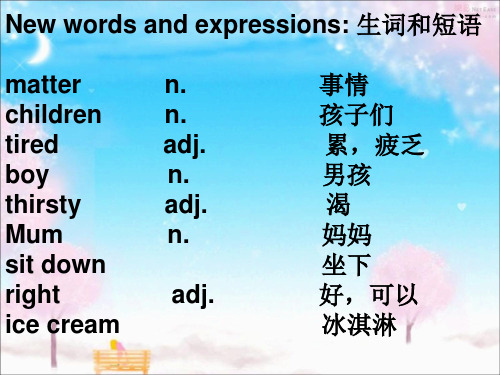
新概念英语第一册Lesson 19
Mother: Here you are, children. Children: Thanks , Mum.
新概念英语第一册Lesson 19
Girl: These ice creams are nice.
新概念英语第一册Lesson 19
Mother: Are you all right now? Children: Yes, we are , thank you !
新概念英语第一册Lesson 19
Mother: What’s the matter , children ? Girl: We’re tired… Boy: … and thirsty , Mum.
新概念英语第一册Lesson 19
Mother: Sit down here.
新概念英语第一册Lesson 19
Mother: Are you all right now? Boy: No,we aren’t.
新概念英语第一册Lesson 19
Mother: Look! There’s an ice cream man.
新概念英语第一册Lesscreams please.
New words and expressions: 生词和短语
matter children tired boy thirsty Mum sit down right ice cream
n. n. adj. n. adj. n. adj.
事情 孩子们 累,疲乏 男孩 渴 妈妈 坐下 好,可以 冰淇淋
新概念英语第一册Lesson 20
新概念英语第一册Lesson 20
新概念英语第一册Lesson 20
新概念英语第一册课文及翻译
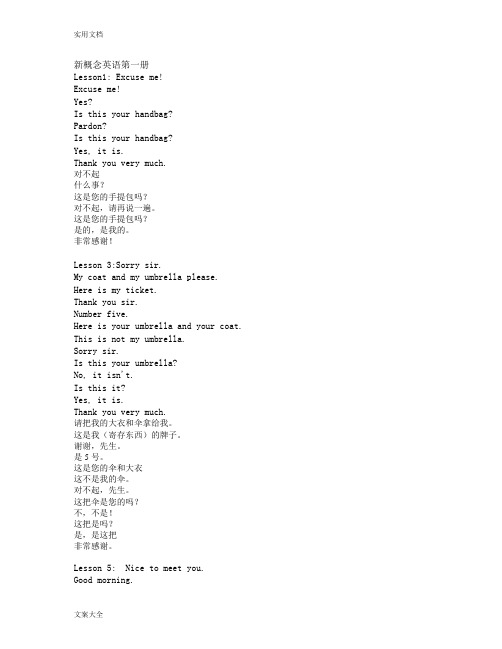
新概念英语第一册Lesson1: Excuse me!Excuse me!Yes?Is this your handbag?Pardon?Is this your handbag?Yes, it is.Thank you very much.对不起什么事?这是您的手提包吗?对不起,请再说一遍。
这是您的手提包吗?是的,是我的。
非常感谢!Lesson 3:Sorry sir.My coat and my umbrella please. Here is my ticket.Thank you sir.Number five.Here is your umbrella and your coat. This is not my umbrella.Sorry sir.Is this your umbrella?No, it isn't.Is this it?Yes, it is.Thank you very much.请把我的大衣和伞拿给我。
这是我(寄存东西)的牌子。
谢谢,先生。
是5号。
这是您的伞和大衣这不是我的伞。
对不起,先生。
这把伞是您的吗?不,不是!这把是吗?是,是这把非常感谢。
Lesson 5: Nice to meet you.Good morning.Good morning, Mr. Blake.This is Miss Sophie Dupont.Sophie is a new student.She is a French.Sophie, this is Hans.He is German.Nice to meet you.And this is Naoko.She’s Japanese.Nice to meet you.And this is Chang-woo.He’s Korean.Nice to meet you.And this is Luming.He’s Chinese.Nice to meet you.And this is Xiaohui.She’s Chinese, too.Nice to meet you.布莱克先生:早上好。
新概念英语第一册笔记-第19课
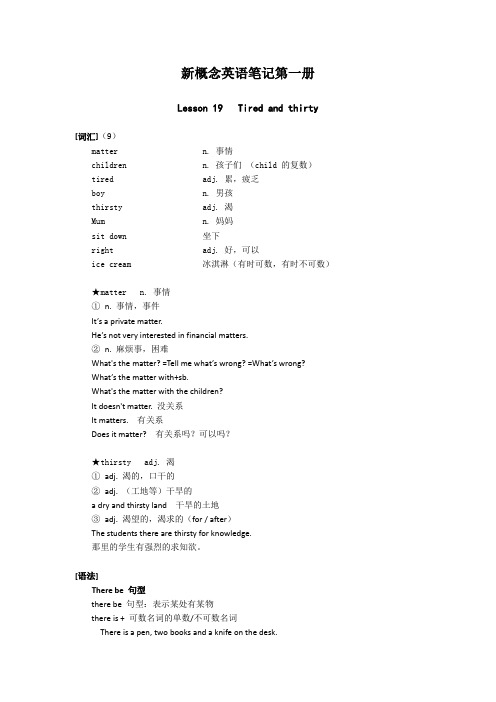
新概念英语笔记第一册Lesson 19 Tired and thirty[词汇](9)matter n. 事情children n. 孩子们(child 的复数)tired adj. 累,疲乏boy n. 男孩thirsty adj. 渴Mum n. 妈妈sit down 坐下right adj. 好,可以ice cream 冰淇淋(有时可数,有时不可数)★matter n. 事情①n. 事情,事件It’s a private matter.He’s not very interested in financial matters.②n. 麻烦事,困难What's the matter? =Tell me what’s wrong? =What’s wrong?What’s the matter with+sb.What's the matter with the children?It doesn't matter. 没关系It matters. 有关系Does it matter? 有关系吗?可以吗?★thirsty adj. 渴①adj. 渴的,口干的②adj. (工地等)干旱的a dry and thirsty land 干旱的土地③adj. 渴望的,渴求的(for / after)The students there are thirsty for knowledge.那里的学生有强烈的求知欲。
[语法]There be 句型there be 句型:表示某处有某物there is + 可数名词的单数/不可数名词There is a pen, two books and a knife on the desk.课桌上有一枝钢笔、两本书和一把小刀。
(第一个并列名词是单数,所以用is)there are + 可数名词的复数形式常见方位介词:in、on、over、underon:在…上面,接触物体表面over:越过,垂直上方,不接触表面in:在…里面,物体里面to:往,向,表示去向方向into:进入…里面,从外到里进入的过程out of:在…外,从里面出来across:横穿[在物体表面横穿],从平面穿过through:从里面(中间)穿过under:在……下面deside:在……旁边near:在……附近between:在……两者之间among 在…中间(两者以上)over:从斜面穿过介词用法:1、跟在be动词之后2、3、跟在一些不及物动词之后。
新概念英语第一册-课文及翻译

新概念英语第一册-课文及翻译Lesson 1 Excuse me! 课文1 对不起!1. Excuse me!对不起2. Yes什么事3. Is this your handbag这是您的手提包吗4. Pardon对不起,请再说一遍。
5. Is this your handbag这是您的手提包吗6. Yes, it is.是的,是我的。
7. Thank you very much.非常感谢!Lesson 3 Sorry, sir. $课文3 对不起,先生。
8. My coat and my umbrella please.请把我的大衣和伞拿给我。
9. Here is my ticket.这是我(寄存东西)的牌子。
10. Thank you, sir.谢谢,先生。
11. Number five.是5号。
12. Here's your umbrella and your coat.这是您的伞和大衣13. This is not my umbrella.这不是我的伞。
14. Sorry sir.对不起,先生。
15. Is this your umbrella这把伞是您的吗16. No, it isn't.不,不是!17. Is this it这把是吗是,是这把19. Thank you very much.非常感谢。
Lesson 5 Nice to meet you $课文5 很高兴见到你。
20. Good morning.早上好。
21. Good morning, Mr. Blake.早上好,布莱克先生。
22. This is Miss Sophie Dupont.这位是索菲娅.杜邦小姐。
23. Sophie is a new student.索菲娅是个新学生。
24. She is French.她是法国人。
25. Sophie, this is Hans.索菲娅,这位是汉斯。
26. He is German.他是德国人。
新概念英语第一册笔记新版:第19课

If someone has deceived you, don't get angry with him, because everybody wants to make a living. And the way of life is so narrow that you cannot but run into others.It's nearly the end of the last year, most of us have the habits to recollect what happened in the last year: something good, something bad, something sad, something happy … But no matter what happened, I think, the best choice for everybody is try to be happy.Lesson 55 The Sawyer family[词汇]live v. 住,⽣活stay v. 呆在,停留Home n. 家;adv. 到家housework n. 家务lunch n. 午饭afternoon n. 下午usually adv. 通常together adv. ⼀起evening n. 晚上arrive v. 到达night n. 夜间live in(at)stay at Homedo the houseworkdo one's Homeworkhave lunch, eat one's lunchin the afternoonat nighttell 告诉mince ⾁馅chicken 鸡⾁butcher 屠夫meat ⾁husband 丈夫beefsteak ⽜排beef ⽜⾁truth 实情,真话together ⼀起usually 通常grape 葡萄peach 桃⼦tomato 西红柿potato ⼟⾖lettuce 莴苣cabbage ⽩菜wardrobe ⾐柜checkroom ⾐帽存放处nationality 国籍refrigerator 冰箱electric 电的Home 家house 房⼦living room 客厅bedroom 卧室kitchen 厨房garden 花园town 城镇village 村庄country 乡下;国家in the afternoon 在下午housework 家务Homework 家庭作业at night 在夜间arrive 到达evening 傍晚,晚间night 夜间too 肯定句中表⽰“也”either 否定句和疑问句中表⽰“也”do one's Homework:做 … 的家庭作业do the housework:做家务in the eveningat night[词汇·略]live:长期居住在 …;短期住dwell:合法居住inhabit:世世代代居住在reside:(正式⽤语)居住在 … [ri5zaid]live in/live atMy uncle lives in Paris.The Sawyers live at 87 King Street.Where do they live? /Where does she(he) live?Where do the student live?live(a.)live show:现场演出make a living:谋⽣live for:为 … ⽽活着stay at Home:呆在家Homeless:⽆家可归Homesick:思乡的Hometown:家乡Homely:家常的Homeland:祖国Homemade:⾃制的Home alone:独⾃在家here, there, Home, upstairs, downstairs, downtown, abroad 这些地点副词前⾯不能加介词do one's housework [⼀般不⽤] do the houseworkbreakfast:早餐supper:晚餐dinner:正餐,宴会meal:⼀顿饭three meals a dayin the eveningarrive in/ atat nightlive in/at:居住go to work:去上班go to school:去上学take sb. to somewhere:带某⼈去……stay at Home 呆在家⾥do the housework 做家务eat/have one's lunch:吃……的午餐see one's friends:拜访……的朋友drink tea together:⼀起喝茶come Home from school:从学校回家come Home from work:下班回家arrive Home 到家do one's Homework:做……的家庭作业go to bed:上床睡觉read one's newspaper:读报纸watch TV:看电视[提⽰]when, where, when, whoWhere do the Sawyers live?They live at eight-seven King Street.What does Mr. Sawyer usually do in the morning?Mr. Sawyer goes to work in the morning.What do the children do in the morning?They go to school.Who takes them every day?Their father. Mr. Sawyer.Mr. Sawyer takes them to school every day.What does Mrs. Sawyer do in the morning?Mrs. Sawyer usually stays at Home.What does she do?She does the Homework.When does Mrs. Sawyer eat her lunch?At noon.What does Mrs. Sawyer do at noon?Eats her lunch.When does Mrs. Sawyer see her friends?In the afternoon.Usually what do they do together?They usually drink tea together.When does Mr. Sawyer come Home from work?In the evening.Does he arrive Home very early?No, he doesn't come Home very early.Do they come Home from school very early?Yes, the children arrive Home very early.What do the children do at night?They usually do their Homework.Then what do they do?They go to bed.What about Mr. Sawyer?Mr. Sawyer usually reads his newspaper.Sometimes he and his wife watch television.[课⽂]The Sawyer live at 87 King Street.In the morning, Mr. Sawyer goes to work and the children go to school.Their father takes them to school every day.Mrs. Sawyer stays at Home every day. She does the housework.She always eats her lunch at noon.In the afternoon, she usually sees her friends. They often drink tea together/in the garden.In the evening, the children come Home from school. They arrive Home early.Mr. Sawyer comes Home from work. He arrives Home late.At night, the children always do their Homework. Then they go to bed. Mr. Sawyer usually reads his newspaper, but sometimes he and his wife watch television.live at, go to work, go to school, take to, stay at home, do the housework, eat one's lunch, see one's friends, drink tea together, come home from school, arrive home, come home from work, do one's Homework, go to bed, read one's newspaper, watch TV重点:⼀般现在时及动词的熟练使⽤。
- 1、下载文档前请自行甄别文档内容的完整性,平台不提供额外的编辑、内容补充、找答案等附加服务。
- 2、"仅部分预览"的文档,不可在线预览部分如存在完整性等问题,可反馈申请退款(可完整预览的文档不适用该条件!)。
- 3、如文档侵犯您的权益,请联系客服反馈,我们会尽快为您处理(人工客服工作时间:9:00-18:30)。
新概念英语第一册第19课课文及翻译
《新概念英语》是由路易斯·乔治·亚历山大所编著,享誉全球的最经典地道的英语教材。
《新概念英语》在中国有四十多年的历史,每年有数百万的不同层次不同类型的学习者,已成为英语学习者的必读。
整理了新概念英语第一册到第四册课文及翻译笔记,希望对广大英语学习者有所帮助。
下面是小编带来的新概念英语第一册第19课课文及翻译,欢迎参考。
新概念英语第一册第19课听力+文本+翻译
Lesson 19 Tired and thirsty 又累又渴
Listen to the tape then answer this question. Why do the children thank their mother?
听录音,然后回答问题。
为什么孩子们向母亲致谢?
MOTHER: What's the matter, children?
GIRL: We're tired …
BOY: … and thirsty, Mum.
MOTHER: Sit down here.
MOTHER: Are you all right now?
BOY: No, we aren't.
MOTHER: Look!
There's an ice cream man.
MOTHER: Two ice cream please.
MOTHER: Here you are, children.
CHILDREN: Thanks, Mum.
GIRL: These ice creams are nice.
MOTHER: Are you all right now?
CHILDREN: Yes, we are, thank you!
New Word and expressions 生词和短语
matter
n. 事情
children
n. 孩子们(child的复数)
tired
adj. 累,疲乏
boy
n. 男孩
thirsty
adj. 渴
Mum
n. 妈妈(儿语)
sit down
坐下
right
adj. 好,可以
ice cream
冰淇淋
参考译文
母亲:怎么啦,孩子们?
女孩:我们累了……
男孩:……口也渴,妈妈。
母亲:坐在这儿吧。
母亲:你们现在好些了吗?
男孩:不,还没有。
母亲:瞧!有个卖冰淇淋的。
母亲:请拿两份冰淇淋。
母亲:拿着,孩子们。
孩子们:谢谢,妈妈。
女孩:这些冰淇淋真好吃。
母亲:你们现在好了吗?
孩子们:是的,现在好了,谢谢您!。
